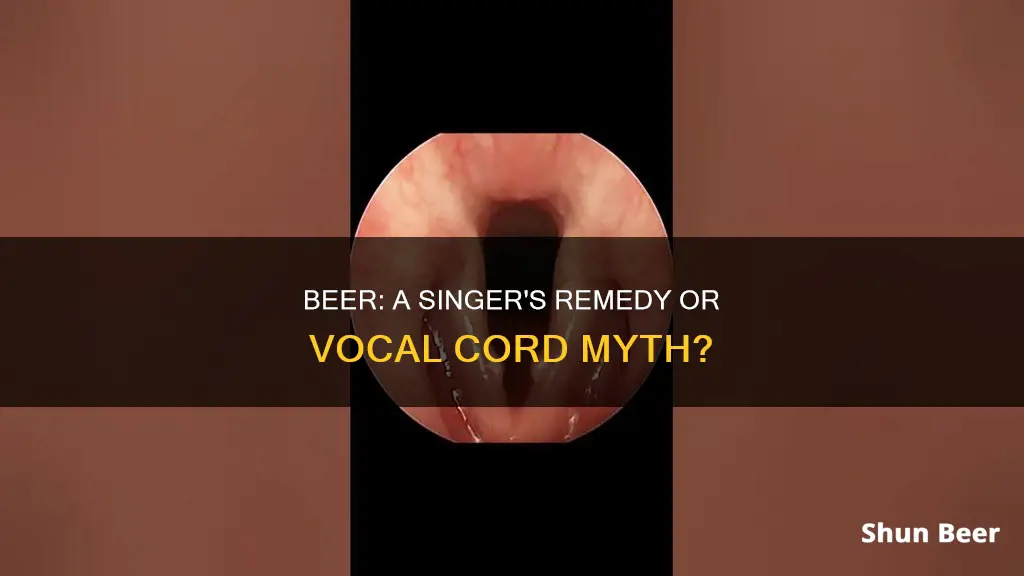
Alcohol consumption has been known to have adverse effects on vocal cords, causing them to become dry, inflamed, and irritated, resulting in a hoarse and raspy voice. Beer, being slightly acidic, can cause mucus build-up in the throat, interfering with the airstream and breathing technique. The alcohol content in beer can also dry out and shrink the vocal cords, negatively impacting the voice. While some believe that alcohol-induced relaxation may improve vocal performance, excessive drinking can lead to vocal cord damage, reduced vocal power, and a gravelly tone. Singers should, therefore, be cautious about consuming alcohol, especially before performances, to maintain optimal vocal health and performance.
What You'll Learn
- Beer causes mucus in the throat, interfering with breathing and airstream
- Beer dries out the vocal cords, reducing range and making the voice sound strained
- Alcohol can cause a burning sensation in the throat
- Alcohol reduces vocal power
- Alcohol can cause permanent damage to the vocal cords, resulting in a gravelly or mannish voice

Beer causes mucus in the throat, interfering with breathing and airstream
Beer is slightly acidic, which can cause mucus in your throat and interfere with your airstream and breathing technique.
The consumption of beer can lead to the production of mucus, which can hinder your vocal cords and cause issues with your breathing and airstream. Beer is slightly acidic, and this acidity can irritate the throat, leading to mucus production. This mucus can reduce the flexibility of your vocal cords, leaving you needing to clear your throat—not ideal if you're midway through a song.
Additionally, the alcohol content in beer can dry out and shrink your vocal cords, further impacting your voice. The combination of mucus and dryness caused by beer can significantly affect your breathing and airstream, making it challenging to maintain a steady and smooth vocal performance.
The effects of beer on mucus production and vocal cord hydration can be particularly detrimental for singers or anyone who relies on their voice professionally. It's important to note that these effects may vary depending on individual tolerance and the amount of beer consumed. However, if you're looking to optimize your vocal health, it's generally advisable to avoid or at least limit your beer consumption.
To maintain optimal vocal cord health, staying hydrated is crucial. Alcohol, in general, has a dehydrating effect on the body, and this includes drying out the vocal cords, leading to hoarseness and irritation. Therefore, drinking plenty of water is essential, especially if you've consumed beer or other alcoholic beverages.
Wisconsin Kids Drinking Beer: Consent and the Law
You may want to see also

Beer dries out the vocal cords, reducing range and making the voice sound strained
Alcoholic drinks can have a dehydrating effect on the body, and beer is no exception. Beer contains alcohol, which dries out the vocal cords, reducing their flexibility and inhibiting their ability to vibrate properly. This results in a reduced vocal range and a strained, cracked voice.
The ethanol in alcoholic beverages, including beer, disrupts the physical structure of cell membranes. This distortion can affect the epithelial cells involved in singing, impairing their ability to vibrate correctly and potentially hindering the transmission of electrical signals in nerve cells. As a result, drinking beer can negatively impact the quality and range of your voice.
In addition to the drying effect, beer can also cause mucus build-up in the throat. This build-up can interfere with your airstream and breathing technique, further hindering your vocal performance. The combination of dryness and mucus can leave your voice sounding strained and hoarse.
The impact of beer on vocal cords can be long-lasting. Even after rehydrating, it may take time for the vocal cords to recover their full flexibility and range. Prolonged or excessive beer consumption can lead to permanent damage, resulting in thickened, stiff, and scarred vocal cords. This damage can cause a significant loss of vocal power, range, and colour.
Therefore, it is essential to consider the potential negative consequences of drinking beer, especially if vocal health and performance are important to you. While moderate consumption may not cause immediate issues, excessive or regular drinking can have a detrimental effect on your vocal cords, reducing your vocal range and quality over time.
Beer and Kidney Infections: Is There a Link?
You may want to see also

Alcohol can cause a burning sensation in the throat
Drinking alcohol can cause a burning sensation in the throat, otherwise known as heartburn. This is due to the irritation alcohol causes to the oesophagus, or food pipe, as well as the stomach. This irritation is caused by the chemicals in alcohol, which can also increase the production of stomach acid.
Heartburn is a painful, burning sensation in the chest and upper throat. It occurs when stomach acid flows back into the oesophagus, causing discomfort and pain. Alcohol is a common cause of heartburn, with those who drink more alcohol or more regularly having a greater likelihood of experiencing it.
In addition to heartburn, alcohol can also cause reflux esophagitis, Barrett's oesophagus, and oesophageal adenocarcinoma. These conditions can cause vocal changes, including making your voice raspier, quieter, and sicklier, or even causing you to lose your voice completely.
Alcohol can also affect your vocal cords directly, causing them to become dry, inflamed, and irritated, which can also make your voice sound hoarse and unpleasant. If you drink heavily or over a long period of time, this irritation can strain your vocal cords and result in a loss of voice.
Beer and Cannabis: Safe Consumption Explored
You may want to see also

Alcohol reduces vocal power
Alcohol can have a severely negative impact on your vocal cords. It is highly dehydrating, and when the vocal cords are dehydrated, they vibrate roughly against each other, causing hoarseness and a loss of vocal power. Alcohol also causes the body to overproduce mucus, which can irritate the vocal cords and cause a person to clear their throat.
Alcohol is drying, irritating, and inflammatory to the vocal cords, and can cause the development of polyps and nodules that may require surgery. It can also lead to chronic laryngitis, which can last for longer than three weeks. This can cause a loss of vocal power, as well as a reduction in the range of the voice.
A person who consumed unlimited free beer before four 3-4 hour shows a week reported losing about 39-40% of their overall vocal power. They were still able to hit the correct notes and control their voice, but the volume level on their microphone had to be increased to compensate for their lack of power. When they stopped drinking beer and switched to a strict "water-only" regimen, they regained their vocal strength.
Alcohol can also affect the tissues of the vocal cords. It can disrupt the physical structure of cell membranes, which can inhibit the transmission of electrical signals in nerve cells. This can cause the vocal cords to not vibrate properly, leading to a reduction in vocal power.
In addition to reducing vocal power, alcohol can also cause other issues with the voice, such as a raspy or cracked voice, a lower pitch, and even permanent damage to the vocal cords. It is therefore advisable to avoid drinking alcohol before singing or speaking publicly, as the negative effects on vocal power and quality largely outweigh any potential positives.
Beer and Seizure Medicine: What You Need to Know
You may want to see also

Alcohol can cause permanent damage to the vocal cords, resulting in a gravelly or mannish voice
Alcohol can be very damaging to the vocal cords, and consistent alcohol use can lead to permanent damage. Alcohol is a diuretic, which means it has a dehydrating effect on the body, including the vocal cords. When the vocal cords aren't hydrated, they vibrate roughly against each other, causing hoarseness and irritation. This can lead to a loss of vocal power and a raspy or gravelly voice.
Alcohol can also cause the body to overproduce mucus, which can interfere with the airstream and breathing and irritate the vocal cords further. This can lead to a cycle of irritation and inflammation, causing the vocal cords to become damaged and swollen. If this damage is ongoing, it can result in chronic laryngitis, which can last for more than three weeks. This prolonged irritation can lead to the formation of vocal polyps and nodules, which may require surgery to remove.
In addition, alcohol can cause permanent thickening, stiffening, and scarring of the vocal cords. This can result in a loss of vocal range, power, and colour. The ethanol in alcohol can disrupt the physical structure of epithelial cells, which line all internal surfaces, including those involved in singing. This distortion can inhibit the transmission of electrical signals in nerve cells, affecting the vibration of the vocal cords and the quality of the voice.
The effects of alcohol on the voice can be long-lasting, and even quitting drinking heavily may not restore the voice to its previous condition. This is evident in the case of actress Kathleen Turner, whose voice changed from a husky tone to a gravelly, mannish sound due to alcohol abuse. Therefore, it is essential to be aware of the potential risks of alcohol consumption on vocal health and to take steps to mitigate these risks, such as reducing alcohol intake or abstaining from alcohol altogether.
Drinking Beer and Taking Nitrofurantoin: What You Should Know
You may want to see also
Frequently asked questions
No, drinking beer will not help with strained vocal cords. Beer is slightly acidic, which will cause mucus in your throat and interfere with your airstream and breathing technique. The alcohol content will also dry out and irritate your vocal cords, making your voice sound hoarse and unpleasant.
Drinking beer can have several negative effects on vocal cords, including:
- Dehydration: Beer is a diuretic, which can lead to dehydration and make your vocal cords dry and inflamed.
- Mucus production: The slight acidity of beer can cause mucus in your throat, leading to a slippery secretion that can irritate your vocal cords when you clear your throat.
- Loss of vocal power: Beer can reduce your overall vocal power, requiring you to increase the volume to compensate.
Yes, there are some drinks that can help soothe strained vocal cords. Warm drinks like tea with honey or herbal tea with lemon and ginger can help hydrate and soothe the throat. Drinking warm water with a pinch of salt can also help moisten the vocal cords and reduce inflammation.
If you want to drink beer without straining your vocal cords, it's important to stay hydrated by drinking plenty of water. Avoid excessive shouting or screaming, as this can put strain on your vocal cords. It's also a good idea to limit your alcohol intake and give your vocal cords rest after drinking.







